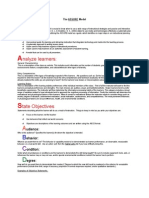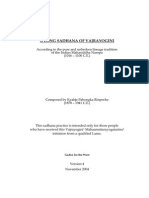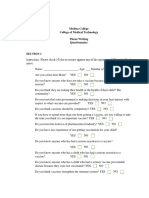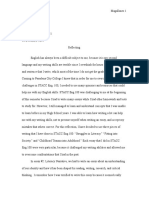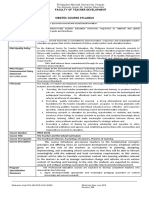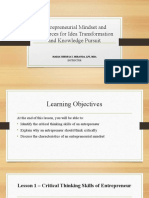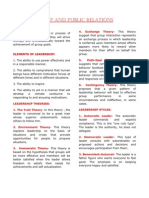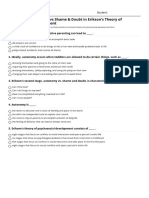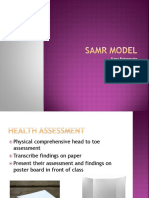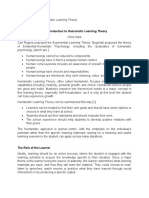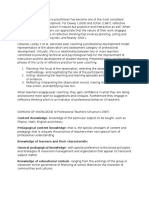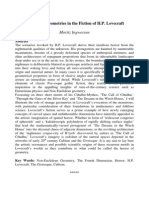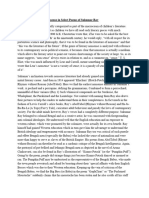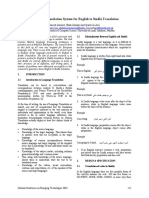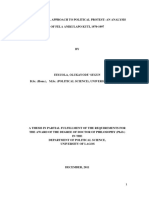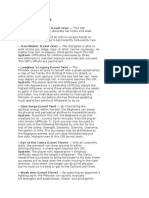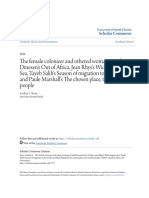Naturalism 3
Naturalism 3
Uploaded by
jean apple Ator0 ratings0% found this document useful (0 votes)
142 views15 pagesNaturalism is an educational philosophy that takes nature as the whole of reality. It focuses on developing a child's natural talents and emotions. Jean-Jacques Rousseau was a prominent advocate of naturalism in the 18th century. He believed education should follow the natural interests of the child and aim for holistic development. According to naturalism, parents are the natural teachers and schools are unnecessary. The curriculum should be child-centered and based on the present and future needs of the child. It emphasizes learning through direct experience and activities rather than books. The goal of education is participation in life and developing the child emotionally and morally according to their needs.
Original Description:
ppt sample
Original Title
Naturalism3
Copyright
© © All Rights Reserved
Available Formats
PPTX, PDF, TXT or read online from Scribd
Share this document
Did you find this document useful?
Is this content inappropriate?
Report this DocumentNaturalism is an educational philosophy that takes nature as the whole of reality. It focuses on developing a child's natural talents and emotions. Jean-Jacques Rousseau was a prominent advocate of naturalism in the 18th century. He believed education should follow the natural interests of the child and aim for holistic development. According to naturalism, parents are the natural teachers and schools are unnecessary. The curriculum should be child-centered and based on the present and future needs of the child. It emphasizes learning through direct experience and activities rather than books. The goal of education is participation in life and developing the child emotionally and morally according to their needs.
Copyright:
© All Rights Reserved
Available Formats
Download as PPTX, PDF, TXT or read online from Scribd
Download as pptx, pdf, or txt
0 ratings0% found this document useful (0 votes)
142 views15 pagesNaturalism 3
Naturalism 3
Uploaded by
jean apple AtorNaturalism is an educational philosophy that takes nature as the whole of reality. It focuses on developing a child's natural talents and emotions. Jean-Jacques Rousseau was a prominent advocate of naturalism in the 18th century. He believed education should follow the natural interests of the child and aim for holistic development. According to naturalism, parents are the natural teachers and schools are unnecessary. The curriculum should be child-centered and based on the present and future needs of the child. It emphasizes learning through direct experience and activities rather than books. The goal of education is participation in life and developing the child emotionally and morally according to their needs.
Copyright:
© All Rights Reserved
Available Formats
Download as PPTX, PDF, TXT or read online from Scribd
Download as pptx, pdf, or txt
You are on page 1of 15
Naturalism
An educational philosophy
Catalino B. Dael III
Naturalism
What is Naturalism?
• in the western world naturalism is the oldest philosophy.
• takes nature as the whole of reality
• In naturalism importance has been given to man’s natural
talents and emotions (Pathak, 2007).
• naturalism is termed as materialism because the basic of
the world is matter.
• deny the existence of any such thing as the supremacy of
God, to them there is nothing else than matter which is
ultimate reality and ultimate truth (Singh, 2007).
What is Naturalism?
• Jean Jacques Rousseau was one of the famous nature
philosophers of the 18th century.
• Rousseau published his famous book “Emile” which contained
Rousseau’s ideas on naturalism.
• Rousseau believed that education should
be given according to the natural interest
of the child aiming at a holistic
development of the personality
• Nature is the best teacher and means
of education
What is Naturalism?
• Rousseau believed that education does not only mean to
memorize or store information and knowledge rather it is
the process which results in the development of the child’s
nature and personality internally.
• Naturalism states that parents are natural teachers and
there is no need for the institutions such as school
(Pathak, 2007).
• A child is a child and not an adult in the making.
Naturalism
Naturalism and the Curriculum
• According to naturalists curriculum must be child centered
according to the present and future needs of the child (Pathak,
2007).
• Naturalists have divided curriculum under two stages
• Earlier stage and Later stage
• In the early stage sensory training is given to the child.
• At the later stage the naturalists included in the curriculum
subjects as physical sciences, language, mathematics, social
studies, anatomy and other subjects (Seetharamu, 2004).
• Moral education also begin part of the curriculum is given
through activities and occupations but not through lectures on
ethics (Shahid, 2000).
Naturalism and the Curriculum
• Stages of Education:
1. Infancy
When the child is at this stage, the child is not
mature. Infants’ psychology is totally different from the
adults. At this stage the child can be taught through
normal conversation (Chandra and Sharma, 2006).
Naturalism and the Curriculum
• Stages of Education:
2. Childhood
Rousseau believed that child should not be given
books up till the age of twelve. The child must learn
through experience. The child learns naturally through his
own actions and starts developing the ability of reasoning
(Chandra and Sharma, 2006).
Naturalism and the Curriculum
• Stages of Education:
3. Adolescence
At this stage the child can be taught formal education.
The child is exposed to various subjects such as
physical sciences, language, mathematics, social studies and
music and drawing and some kind of professional training.
According to Rousseau, education should be given through
activities and not by books because activities give more
knowledge than books (Chandra and Sharma, 2006).
Naturalism and the Curriculum
• Stages of Education:
4. Youth
At this stage special emphasis is laid on moral and
religious education. Moral education can also be derived
through actual experience. Religious education can be
taught through the teachings of history, mythological
stories and religious stories (Chandra and Sharma,
2006).
Naturalism and the Curriculum
• According to Rousseau, aim of education is not preparation for
life, but participation in it.
• The aim of education during the first stage of a child is to gain
knowledge and all the wants and needs of a child are to be
fulfilled.
• The second aim of education is to provide the child with the
strength that the child lacks of the ability of being free (Khalid,
1998).
• At the third stage the aim of education is to enable the child to
acquire useful knowledge which would satisfy the child’s wants.
• The aim of education is to develop the child emotionally and
morally according to the child’s needs (Shahid, 2000).
Naturalism
The Teacher and the Students
• According to naturalists people learn more through direct
experience that is by doing rather than by reading the
books.
• Another method is Heuristic method which means to find
or to discover, the children are provided with situation
and opportunities and the children search.
• Naturalists stress upon direct method of teaching.
Teaching through things rather than words is given
importance (Saho, 2002).
• Rousseau emphasized two-way play method of teaching,
learning by doing, during play also child learns a lot and is
educated (Khalid, 1998).
Thank you for listening
and God bless.
You might also like
- Physics Project CBSE-XIDocument15 pagesPhysics Project CBSE-XIakul singh69% (77)
- Fate of Harn v2.0Document51 pagesFate of Harn v2.0Alun Rees100% (4)
- Module (MMW) - Unit 2Document23 pagesModule (MMW) - Unit 2Jam DomingoNoch keine Bewertungen
- Naruto Databook 1 DescargarDocument4 pagesNaruto Databook 1 DescargarCamila Antonia Carrasco MondacaNoch keine Bewertungen
- CSC102 - Discrete Structure - COURSE - HANDBOOK - SP20 - UpdatedDocument6 pagesCSC102 - Discrete Structure - COURSE - HANDBOOK - SP20 - UpdatedanamNoch keine Bewertungen
- The Blue-Print of ASSURE Instructional ModelsDocument3 pagesThe Blue-Print of ASSURE Instructional ModelsFery AshantiNoch keine Bewertungen
- 50 Super-Fun Math Activities Grade 6Document64 pages50 Super-Fun Math Activities Grade 66v9100% (1)
- Engineering Management PrinciplesDocument27 pagesEngineering Management PrinciplesJustine San Juan75% (4)
- Friedman, Michael - Geometry As A Branch of Physics. Background and Context For Eisnstein's 'Geometry and Experience'Document19 pagesFriedman, Michael - Geometry As A Branch of Physics. Background and Context For Eisnstein's 'Geometry and Experience'John Joseph DorschNoch keine Bewertungen
- Vajrayogni Long SadhanaDocument44 pagesVajrayogni Long SadhanaNilsonMarianoFilhoNoch keine Bewertungen
- NaturalismDocument9 pagesNaturalismNonita TanNoch keine Bewertungen
- ATTENTIONDocument12 pagesATTENTIONaritrayeebarman05Noch keine Bewertungen
- LO 3 Motivation CH 5 Newstrom OB 2011Document31 pagesLO 3 Motivation CH 5 Newstrom OB 2011Jinnie QuebrarNoch keine Bewertungen
- Medina College College of Medical Technology Thesis Writing QuestionnaireDocument5 pagesMedina College College of Medical Technology Thesis Writing QuestionnaireDhanimie FayeNoch keine Bewertungen
- Definition Massive Open Online CoursesDocument5 pagesDefinition Massive Open Online Coursesapi-309004569Noch keine Bewertungen
- 02 Understanding Adult Learning ProcessDocument7 pages02 Understanding Adult Learning ProcessMak ShawonNoch keine Bewertungen
- Research Report Rubric TLEDocument1 pageResearch Report Rubric TLETLE100% (13)
- Math 21-2 Syllabus (Ar)Document6 pagesMath 21-2 Syllabus (Ar)Joyce CulloNoch keine Bewertungen
- Acknowledgement PDFDocument1 pageAcknowledgement PDFMystariouss SahirNoch keine Bewertungen
- Teaching AidsDocument3 pagesTeaching Aidsapi-231516879100% (1)
- What Is A Case StudyDocument20 pagesWhat Is A Case StudyPriyanka Ravi100% (2)
- Philosophical Foundations of Curriculum DevelopmentDocument34 pagesPhilosophical Foundations of Curriculum DevelopmentAdeeb AhmadNoch keine Bewertungen
- Living Values Education Rainbow Booklet Activities For Children 8 14 Book 1 Unit 2 RespectDocument52 pagesLiving Values Education Rainbow Booklet Activities For Children 8 14 Book 1 Unit 2 RespectBrama FNoch keine Bewertungen
- Course Packet in Cur. DevDocument79 pagesCourse Packet in Cur. DevAseret OdiamanNoch keine Bewertungen
- Distance Education 13MBDocument231 pagesDistance Education 13MBArianne Rose Fangon100% (1)
- Teacher Education Department: EpistemologyDocument5 pagesTeacher Education Department: EpistemologyIvanne MeinelNoch keine Bewertungen
- Selecting Learning ActivitiesDocument9 pagesSelecting Learning ActivitiesMimi LabindaoNoch keine Bewertungen
- Kuder Career Interests Assessment Kuder Skills Confidence AssessmentDocument4 pagesKuder Career Interests Assessment Kuder Skills Confidence Assessmentapi-302122869Noch keine Bewertungen
- The Role of The Student in The Instructional ProcessDocument3 pagesThe Role of The Student in The Instructional ProcessRahshen R BarberNoch keine Bewertungen
- Research Proposal GuideDocument5 pagesResearch Proposal GuideVimbai ChinoonekaNoch keine Bewertungen
- The Nature of Teaching and LearningDocument12 pagesThe Nature of Teaching and LearningApolonia Molina100% (1)
- Philosophy of Teaching 1Document1 pagePhilosophy of Teaching 1Pauline Adriane BejaNoch keine Bewertungen
- Reflection EssayDocument4 pagesReflection Essayapi-294170263Noch keine Bewertungen
- Childrens LiteratureDocument9 pagesChildrens LiteratureLaiza Limpag EgloriaNoch keine Bewertungen
- The Integrative Strategies of TeachingDocument22 pagesThe Integrative Strategies of TeachingDan Lhery Susano GregoriousNoch keine Bewertungen
- ACCT5908 Auditing and Assurance Services S12016Document39 pagesACCT5908 Auditing and Assurance Services S12016Neethu JoyNoch keine Bewertungen
- 2223 Prof Ed 06 - The Teacher and The School CurriculumDocument8 pages2223 Prof Ed 06 - The Teacher and The School CurriculumCyl perezNoch keine Bewertungen
- HOTS IT-based ProjectsDocument14 pagesHOTS IT-based ProjectsmarygracejaspesiarotNoch keine Bewertungen
- Data Analysis and InterpretationDocument15 pagesData Analysis and InterpretationJohn Christian SuarezNoch keine Bewertungen
- Critical Thinking Skills of EntrepreneurDocument12 pagesCritical Thinking Skills of EntrepreneurJessica Reambillo100% (1)
- CHAPTER 2naturalism and The Unity of Scientific MethodDocument5 pagesCHAPTER 2naturalism and The Unity of Scientific MethodJulius MacaballugNoch keine Bewertungen
- Jaiby Jacob - FinalDocument148 pagesJaiby Jacob - FinalJaiby Jacob100% (1)
- How To Write A Good Research - ProposalDocument36 pagesHow To Write A Good Research - ProposalEngineer MustafaNoch keine Bewertungen
- Understanding The Job Satisfaction of Music, Arts, Physical Education and Health Teachers in Indigenous People Schools As Predicted by Motivation A Convergent Parallel ApproachDocument40 pagesUnderstanding The Job Satisfaction of Music, Arts, Physical Education and Health Teachers in Indigenous People Schools As Predicted by Motivation A Convergent Parallel ApproachInternational Journal of Innovative Science and Research TechnologyNoch keine Bewertungen
- TTL 1 L3 ModuleDocument6 pagesTTL 1 L3 ModuleAllyssa JhaneNoch keine Bewertungen
- MIDTERM Foundation of EducationDocument4 pagesMIDTERM Foundation of EducationBea Marie QuintinoNoch keine Bewertungen
- Leadership and Public RelationsDocument2 pagesLeadership and Public RelationsDeeGee BeelaskooNoch keine Bewertungen
- BrunerDocument16 pagesBrunerJay B GayleNoch keine Bewertungen
- Social, Ethical, and Legal Responsibilities in The Use of Technology Tools and Resources Digital Citizenship ObjectivesDocument4 pagesSocial, Ethical, and Legal Responsibilities in The Use of Technology Tools and Resources Digital Citizenship ObjectivesVal Daryl AnhaoNoch keine Bewertungen
- Quiz Worksheet Autonomy in Psychosocial Growth PDFDocument1 pageQuiz Worksheet Autonomy in Psychosocial Growth PDFAndrei PostolacheNoch keine Bewertungen
- Problem Based and Project Based LearningDocument8 pagesProblem Based and Project Based LearningJessie Mae Jauod OlaoNoch keine Bewertungen
- Natural ResourcesDocument24 pagesNatural ResourcesAdalberto PwNoch keine Bewertungen
- Scope and Sequence Practical Research 2Document2 pagesScope and Sequence Practical Research 2Tek CasoneteNoch keine Bewertungen
- Development and Validation of Modules Integrating Education For Sustainable DevelopmentDocument21 pagesDevelopment and Validation of Modules Integrating Education For Sustainable DevelopmentAnne Besin-LaquianNoch keine Bewertungen
- Syllabus - College Algebra (New)Document5 pagesSyllabus - College Algebra (New)Is JulNoch keine Bewertungen
- Programmes and CodesDocument13 pagesProgrammes and CodeshellosynergylsNoch keine Bewertungen
- Samr ModelDocument15 pagesSamr Modelapi-458907281Noch keine Bewertungen
- Authentic AssessmentDocument27 pagesAuthentic AssessmentMark Andrew FernandezNoch keine Bewertungen
- Humanistic Learning TheoryDocument2 pagesHumanistic Learning Theorylouise beaNoch keine Bewertungen
- Ped 04 DocDocument4 pagesPed 04 DocJake Arman Principe100% (1)
- Philo 2Document32 pagesPhilo 2noel edwin labore50% (2)
- Characteristics of Adolecents and Their Implications in EducationDocument9 pagesCharacteristics of Adolecents and Their Implications in EducationTobias NagmakecebadaiNoch keine Bewertungen
- Self ConceptDocument6 pagesSelf ConceptCherryNoch keine Bewertungen
- Teaching Mathematics in The Primary Grades Sir Joseph D. ReyesDocument24 pagesTeaching Mathematics in The Primary Grades Sir Joseph D. ReyesGodwin Jerome ReyesNoch keine Bewertungen
- Concept Map RubricsDocument7 pagesConcept Map RubricsJXDZ. TVNoch keine Bewertungen
- OERDoc - 529 - 12053 - 11 - 08 - 2021 2Document22 pagesOERDoc - 529 - 12053 - 11 - 08 - 2021 2husny.21008008Noch keine Bewertungen
- Foundations of Education 831 - Unit 2 Philosophical Foundations of Education - Dr. Zaheer AhmadDocument58 pagesFoundations of Education 831 - Unit 2 Philosophical Foundations of Education - Dr. Zaheer Ahmadumme ammaraNoch keine Bewertungen
- Literary Criticism Lecture NotesDocument26 pagesLiterary Criticism Lecture NotesArci Tacpal100% (1)
- IngwersenDocument11 pagesIngwersengalaxy5111Noch keine Bewertungen
- Three Myths and One Model by Jeremy TillDocument5 pagesThree Myths and One Model by Jeremy TillwhatsinausernameNoch keine Bewertungen
- Abol Tabol Nonsense LiteratureDocument4 pagesAbol Tabol Nonsense Literaturearoychowdhury30Noch keine Bewertungen
- General Principles of Legal EthicsDocument6 pagesGeneral Principles of Legal EthicsAtif RehmanNoch keine Bewertungen
- Nec World Bridge Championships Albuquerque, New Mexico, UsaDocument12 pagesNec World Bridge Championships Albuquerque, New Mexico, UsaVault VaultNoch keine Bewertungen
- Keith Jarrett and GurdjieffDocument19 pagesKeith Jarrett and GurdjieffPietreSonore67% (3)
- Unit 2 - People in OrganisationsDocument9 pagesUnit 2 - People in OrganisationsrandadibajeNoch keine Bewertungen
- Same Sex MarriageDocument16 pagesSame Sex Marriagetina_dadlani100% (1)
- Advantages of MultilingualismDocument6 pagesAdvantages of MultilingualismanglicusNoch keine Bewertungen
- 1.syntactical Translation System For English To Sindhi TranslationDocument4 pages1.syntactical Translation System For English To Sindhi Translationimdad aliNoch keine Bewertungen
- Bhaja GovindamDocument26 pagesBhaja GovindamVighnesh Kamath100% (1)
- Cicero Outline of de DivinationeDocument5 pagesCicero Outline of de DivinationeKat UyNoch keine Bewertungen
- Behavioural Approach To Political Protest An Analysis of Fela AnikulapoDocument250 pagesBehavioural Approach To Political Protest An Analysis of Fela AnikulapoMeilhtNoch keine Bewertungen
- The Unity of Mystical TraditionsDocument321 pagesThe Unity of Mystical Traditionsyochai_ataria100% (6)
- KeystoneDocument4 pagesKeystoneapi-295642924Noch keine Bewertungen
- Allama IqbalDocument4 pagesAllama IqbalNeelam ZahraNoch keine Bewertungen
- The Nation As Imagined CommunityDocument10 pagesThe Nation As Imagined CommunityBeverly A. CannuNoch keine Bewertungen
- Komatsu Forklift Truck Fd100!8!7725 Up Operation Maintenance Manual Ten00560 12Document23 pagesKomatsu Forklift Truck Fd100!8!7725 Up Operation Maintenance Manual Ten00560 12jeffreydavidson020196abq100% (109)
- ST-06 Machine Room Bottom Plan Reinforcement Details of "MERCADO" Sec-80 GGNDocument46 pagesST-06 Machine Room Bottom Plan Reinforcement Details of "MERCADO" Sec-80 GGNRAKESH KUMARNoch keine Bewertungen
- Bastet Tribal GiftsDocument10 pagesBastet Tribal GiftsRuivo LucasNoch keine Bewertungen
- The female colonizer and othered woman in Isak Dinesen's Out of Africa, Jean Rhys's Wide Sargasso Sea, Tayeb Salih's Season of migration to the north, and Paule Marshall's The chosen place, the timeless peopleDocument81 pagesThe female colonizer and othered woman in Isak Dinesen's Out of Africa, Jean Rhys's Wide Sargasso Sea, Tayeb Salih's Season of migration to the north, and Paule Marshall's The chosen place, the timeless peopleAilen AlmaNoch keine Bewertungen
- Attitudes of Teachers Towards Inclusive Education inDocument7 pagesAttitudes of Teachers Towards Inclusive Education inabuhaymNoch keine Bewertungen





